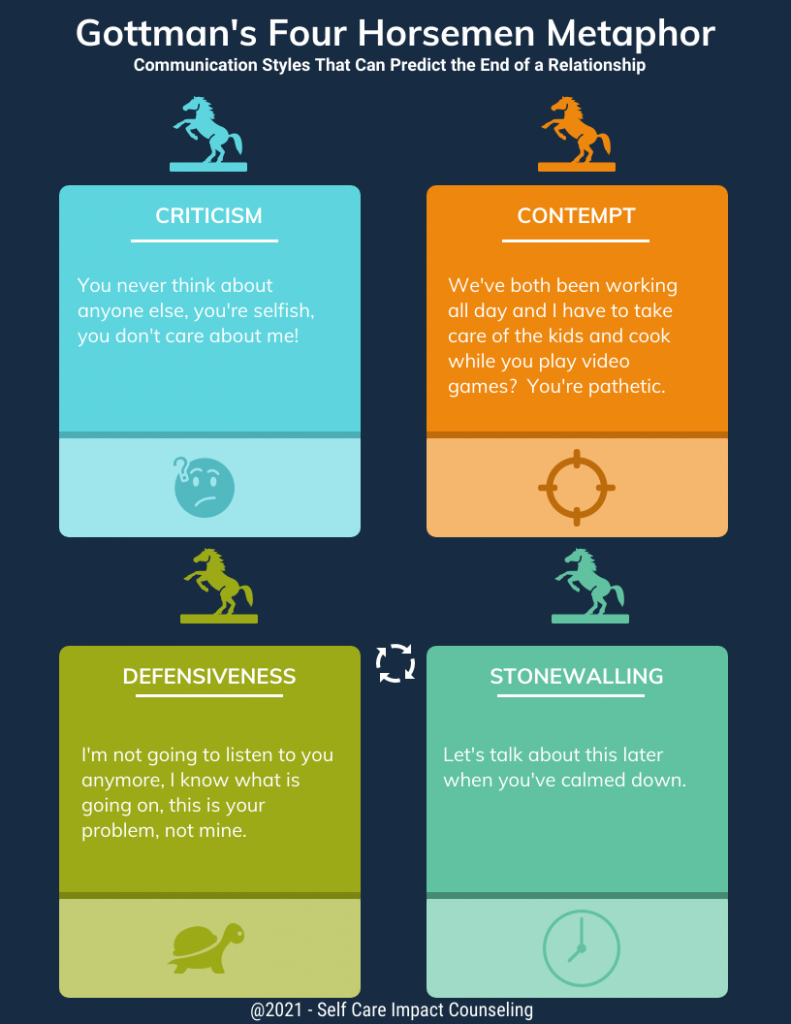When it comes to understanding the dynamics of a relationship, few people have done as much work as Dr. John Gottman. With over four decades of research, Gottman has become a leading figure in the study of marriages and what leads to their success or failure. Among his most significant contributions is the identification of four key behaviors that are highly predictive of divorce. These behaviors, metaphorically referred to as “The Four Horsemen of the Apocalypse,” provide crucial insights into the health of your relationship.

The Four Key Indicators of Your Upcoming Divorce
1. Criticism: Unlike constructive feedback, criticism involves attacking someone’s character or personality rather than addressing specific behavior. It’s the difference between saying, “I’m upset you didn’t do the dishes” and “You’re so lazy and never think about others.” Criticism lays the groundwork for the other horsemen to follow.
Criticizing your partner’s character can be perceived as a personal attack, often leading to negative spirals in the relationship. For instance, a comment like “You’re so careless” can feel like an insult. A more constructive approach would be to say, “Could you please double-check that bill before I send it out?” This way, concerns are expressed without triggering defensiveness in your partner.
2. Contempt: This is a step beyond criticism. Contempt involves treating your partner with disrespect, mockery, sarcasm, and disdain. Examples include eye-rolling, sneering, name-calling, and hostile humor. Contempt is particularly poisonous as it conveys disgust and superiority, deeply wounding a partner’s sense of self.
Contempt is often seen as one of the most damaging emotions in relationships. It conveys a deep lack of regard for your partner, potentially making them feel devalued and unloved. In your interactions, it’s important to communicate openly and honestly. Expressing yourself fully can lead to a greater sense of personal well-being and a healthier relationship, provided it’s done in a way that doesn’t harm the other person.
3. Defensiveness: Often a response to criticism, defensiveness is an attempt to protect oneself from a perceived attack. It usually involves making excuses, playing the innocent victim, or counterattacking. This behavior prevents open communication and problem-solving, as it shifts blame instead of addressing issues head-on.
Individuals who adopt a defensive stance often resort to explanations, justifications, and personalizations as shields. They sidestep their partner’s concerns by reflecting them back onto the partner. For instance, they might say, “I didn’t mean to raise my voice; you just don’t grasp the stress I’m under at work.” Or, “It wasn’t my fault we were late to dinner; it was your sister’s getting lost that delayed us. You know how absent-minded she can be!” While articulating your perspective or clarifying your stance might feel satisfying, there are more constructive approaches to handle such situations.
4. Stonewalling: Eventually, one partner might start to withdraw from interactions altogether, shutting down and closing themselves off from the other. This is stonewalling. It’s a way to avoid conflict, but in doing so, it also avoids resolution and connection. Often, it’s a sign of feeling emotionally overwhelmed or flooded.
Emotionally, this approach might feel like a relief, as no one enjoys conflict with their spouse. However, in practice, stonewalling tends to exacerbate relationship problems. If you notice yourself resorting to this during disagreements, it’s beneficial to request some time apart to gather your thoughts. Importantly, always ensure to revisit the discussion with your partner to work towards a resolution.
How can I improve my odds?
Identifying these behaviors is just the first step. The goal is not only to recognize them but also to understand their antidotes:
- Criticism can be countered by a Gentle Start-Up: Addressing issues directly and respectfully, focusing on specific behaviors and how they make you feel.
- Contempt must be replaced with Appreciation and Respect: Regularly expressing appreciation, gratitude, and affection builds a positive foundation.
- Defensiveness needs to be substituted with Accepting Responsibility: Owning up to your part in a conflict can defuse tension and open the way for constructive dialogue.
- Stonewalling should be addressed by Self-Soothing and Re-engagement: Taking time to cool down and then returning to the conversation can prevent emotional flooding.
Relationship Help in the Denver Area
The Gottman Method, often referred to as Gottman Couples Therapy, represents an effective method in couples counseling, deeply rooted in scientific study. This approach empowers a trained marriage therapist to guide couples in altering harmful behavioral patterns. Within the framework of Gottman Couples Therapy, couples are encouraged to enhance their positive exchanges, communicate with greater clarity, and rejuvenate their affection by rediscovering each other.
Our marriage therapists have received training in the Gottman Method. Reach out to us for a consultation, and we’ll assist you in steering your relationship towards a positive direction.
Take a look at our Couples/Marriage Counseling Specialty Page for more information. Then we invite you to call us at 720-551-4553 for a free 20-minute phone consultation with a marriage specialist. You can schedule your appointment via phone, or the contact page on our website. We look forward to hearing from you.
Self Care Impact Counseling envisions a new age of counseling for adolescents, adults, couples & groups that makes a REAL difference with core values of GROWTH | BALANCE | COMPASSION | INNER HARMONY..

